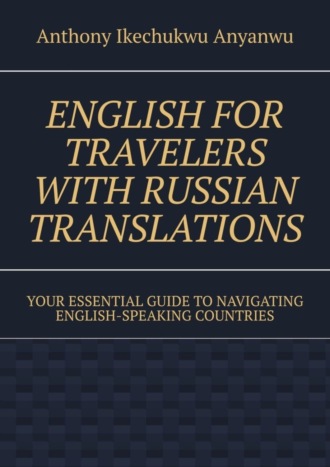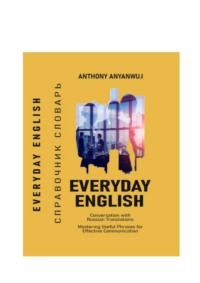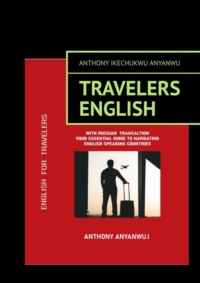
Полная версия
English for travelers with Russian translations. Your essential guide to navigating english-speaking countries
Passenger: Great, thanks!
Airport Staff: No problem.
English
Passenger: How do I get to the baggage claim area?
Airport staff: After exiting the plane, follow the signs to Baggage Claim. It is located on the first floor near the exit.
Passenger: Is it far from here?
Airport staff: No, about 5 minutes walk.
Passenger: Great, thank you!
Airport staff: You’re welcome.
Dialogue 3: Asking for Directions to the Restroom
Passenger: Excuse me, where is the nearest restroom?
Airport Staff: The nearest restroom is down this hall on your left.
Passenger: Thank you.
Airport Staff: You’re welcome.
English
Passenger: Excuse me, where is the nearest toilet?
Airport staff: The nearest toilet is at the end of this corridor on the left. Passenger: Thank you.
Airport staff: Please.
Dialogue 4: Asking for Directions to the Check-in Counter
Passenger: Can you tell me how to get to the check-in counter for British Airways?
Airport Staff: The check-in counters for British Airways are in Terminal 2. Go straight ahead and take the elevator to the second floor.
Passenger: Thanks a lot!
Airport Staff: Anytime.
Russian Translation:
Passenger: Can you tell me how to get to the British Airways check-in counter?
Airport staff: British Airways check-in desks are located in Terminal 2. Go straight ahead and take the lift to the second floor.
Passenger: Thank you very much!
Airport staff: You are welcome.
Dialogue 5: Asking for Directions to the Information Desk
Passenger: Excuse me, where can I find the information desk?
Airport Staff: The information desk is located near the main entrance, next to the security check area.
Passenger: Thank you.
Airport Staff: You’re welcome.
Russian Translation:
Passenger: Excuse me, where can I find information?
Airport staff: The information desk is located next to the main entrance, near the security control area.
Passenger: Thank you.
Airport staff: Please.
Useful Phrases
– Is there a map of the airport?
– Can you show me on the map?
– How long does it take to get there?
– Is there a shuttle service?
– Which terminal is for international flights?
– Where is the nearest exit?
– Can you help me with directions?
– I’m looking for the customs area.
– Where is the immigration office? (Where is passport control?)
UNDERSTANDING ANNOUNCEMENTS
Understanding airport announcements is crucial for a smooth travel experience. Announcements provide important information about flights, boarding, delays, and other travel-related updates. Here are some common announcements you might hear at the airport.
Understanding airport announcements is essential to a comfortable travel experience. Announcements provide important information about flights, boarding, delays, and other travel-related updates. Here are some common announcements you might hear at the airport.
Key Phrases
– Attention please (Attention, please)
– Flight
– Boarding
– Delayed
– Cancelled
– Gate change
– Last call
– Passenger
– Please proceed to (Please proceed to)
– Departure
– Arriving
Announcements
Announcement 1: Flight Boarding
English: «Attention please, passengers on flight BA256 to London. Boarding is now beginning at Gate 18. Please have your boarding pass and passport ready.»
English: «Attention, please, passengers on flight BA256 to London. Boarding begins at Gate 18. Please have your boarding pass and passport ready.»
Announcement 2: Flight Delayed
English: «Attention please, flight AF123 to Paris is delayed due to weather conditions. The new departure time is 2:30 PM. We apologize for the inconvenience.»
English: «Please note that flight AF123 to Paris is delayed due to weather conditions. The new departure time is 14:30. We apologize for the inconvenience.»
Announcement 3: Gate Change
English: «Attention please, passengers on flight DL789 to New York. There has been a gate change. The new gate is 24. Please proceed to Gate 24 for boarding.»
English: «Attention, please, passengers on flight DL789 to New York. There has been a gate change. The new gate is Gate 24. Please proceed to Gate 24 to board.»
Announcement 4: Last Call
English: «Last call for passengers on flight UA456 to Chicago. Please proceed to Gate 10 immediately. This is the final boarding call.»
English: «Last call for passengers on flight UA456 to Chicago. Please report to Gate 10 immediately. This is the last call for boarding.»
Announcement 5: Flight Cancellation
English: «Attention please, passengers on flight LH321 to Frankfurt. Unfortunately, this flight has been cancelled. Please proceed to the airline service desk for rebooking options.»
English: «Attention, please, passengers of flight LH321 to Frankfurt. Unfortunately, this flight has been cancelled. Please proceed to the airline service counter for reissue of tickets.»
Useful Announcements (Additional Useful Announcements)
English:
– «Attention please, security check will be closing in 15 minutes. Please proceed to the security area.»
– «Baggage claim for flight QR890 from Doha is now available at Carousel 5.»
– «Attention, passengers traveling with infants, please board the plane first.»
English:
– «Attention, please, security control will close in 15 minutes. Please proceed to the control area.»
– «Baggage claim for flight QR890 from Doha is available at carousel 5.»
– «Attention, passengers with infants, please board the aircraft first.»
Tips for Understanding Announcements
Understanding airport announcements is crucial for a smooth travel experience. Here are some tips to help you:
Listen for Key Information
Focus on flight numbers, destinations, gate numbers, and times.
Listen for key information: Focus on flight numbers, destinations, gate numbers and times.
Stay Near Your Gate
Announcements are often clearer near the gate area.
English: Stay near your gate: announcements are often best heard in the gate area.
Ask for Clarification
If you don’t understand an announcement, ask an airport staff member for help.
Ask for clarification: If you don’t understand the announcement, ask an airport employee for help.
Watch for Visual Announcements
Many airports display announcements on screens, which can be easier to understand.
CUSTOMS AND IMMIGRATION: Key Phrases and Questions
When you arrive at your destination, you will need to go through customs and immigration. Understanding key phrases and common questions will help you navigate this process more smoothly. Here are some essential phrases and questions with their Russian translations.
Key Phrases
– Customs
– Immigration
– Passport
– Visa
– Declaration form
– Baggage claim
– Duty-free
– Luggage
Common Questions at Immigration
Questions
– What is the purpose of your visit?
– Examples:
– English: «I’m here for tourism.»
– English: «I’m here for tourism.»
– English: «I’m here for business.»
– English: «I’m here on business.»
– How long will you be staying?
– Examples:
– English: «I will be staying for two weeks.»
– English: «I’ll be here for two weeks.»
– English: «I will be here for a month.»
– English: «I’ll be here for a month.»
– Where will you be staying?
– Examples:
– English: «I will be staying at a hotel.»
– English: «I will be staying at the hotel.»
– English: «I will be staying with friends.»
– English: «I’ll be staying with friends.»
– Do you have a return ticket?
– Examples:
– English: «Yes, here is my return ticket.»
– English: «Yes, here is my return ticket.»
– English: «No, I need to purchase one.»
– English: «No, I need to buy a ticket.»
– Have you been to this country before?
– Examples:
– English: «No, this is my first time.»
– English: «No, this is my first time here.»
– English: «Yes, I visited last year.»
– English: «Yes, I was here last year.»
– Do you have anything to declare?
– Examples:
– English: «No, I have nothing to declare.»
– English: «No, I have nothing to declare.»
– English: «Yes, I have some items to declare.»
– English: «Yes, I have items to declare.»
Common Questions at Customs
Questions
– Are you carrying any prohibited items?
– Examples:
– English: «No, I am not.»
– English: «No, I don’t have any prohibited items.»
– English: «I have some medication, is that allowed?»
– English: «I have medication, is that allowed?»
– Do you have any food, plants, or animals?
– Examples:
– English: «No, I don’t.»
– English: «No, I don’t have one.»
– English: «Yes, I have some snacks.»
– English: «Yes, I have some food.»
– What items are you bringing into the country?
– Examples:
– English: «I have clothes and personal items.»
– English: «I have clothes and personal belongings.»
– English: «I have some gifts for friends.»
– English: «I have gifts for my friends.»
– How much currency are you carrying?
– Examples:
– English: «I have $500 in cash.»
– Russian: «I have $500 in cash.»
– English: «I have €200.»
– Russian: «I have €200.»
– Do you have any electronics or valuable items?
– Examples:
– English: «I have a laptop and a camera.»
– Russian: «I have a laptop and a camera.»
– English: «Just my mobile phone.»
– English: «Just my mobile phone.»
Additional Useful Phrases
– Please fill out this declaration form.
– Welcome to our country.
– Enjoy your stay.
– Do you have any checked luggage?
– Follow the signs to baggage claim.
– You need to pay duty on these items.
CHAPTER 3
TRANSPORTATION
TAKING A TAXI
This detailed conversation covers various situations that might arise during a taxi ride, ensuring smooth communication for travelers.
This detailed conversation covers various situations that may arise during a taxi ride, ensuring smooth communication for travelers.
1. Hailing a Taxi (Taxi Stop)
– English: Excuse me, are you free?
– Excuse me, are you free?
– English: Can you take me to (destination)?
– Can you take me to (destination)?
– English: How much will it cost?
– How much will it cost?
2. Getting into the Taxi
– English: Thank you. Do you know how to get to (destination)?
– English: Thank you. Do you know how to get to (destination)?
– English: I need to be there by [time]. Is that possible?
– English: I need to be there by [time]. Is that possible?
3. During the Ride:
– English: Could you turn on the meter, please?
– Can you turn on the meter, please?
– English: Could you please take the quickest route?
– English: Please choose the fastest route.
– English: How long have you been driving a taxi?
– How long have you been driving a taxi?
– English: Is there usually a lot of traffic at this time?
– Is there usually a lot of traffic at this time?
4. Asking About the City:
– English: What are some good places to visit around here?
– English: What are some good places to visit here?
– English: Do you know any good restaurants nearby?
– Do you know any good restaurants nearby?
– English: Are there any events happening in the city this week?
– Are there any events happening in the city this week?
5. Discussing the Fare:
– English: How is the fare calculated?
– How is the fare calculated?
– English: Can I pay by card, or do you prefer cash?
– English: Can I pay by card or do you prefer cash?
– English: Do you have change for a large bill?
– Do you have change from a large bill?
6. Nearing the Destination:
– English: We are almost there, right?
– We ’re almost there, right?
– English: You can drop me off at the corner.
– You can drop me off at the corner.
– English: Is this a good spot to stop?
– Is this a good place to stay?
7. Arriving at the Destination:
– English: This is fine, I’ll get off here.
– It ’s okay here, I’ll get out here.
– English: How much do I owe you?
– How much do I owe you?
– English: Thank you for the ride!
– Thanks for the ride!
8. Parting Ways:
– English: Have a good day!
– Have a nice day!
– Take care!
– All the best!
This detailed conversation covers various situations that might arise during a taxi ride, ensuring smooth communication for travelers.
USING PUBLIC TRANSPORTATION: Buses, Trains, and Subways
This detailed conversation should help travelers navigate buses, trains, and subways smoothly while ensuring effective communication.
This detailed conversation should help travelers navigate buses, trains and subways easily, ensuring effective communication.
1. Asking for Directions:
– English: Excuse me, how do I get to the bus/train/subway station?
– Excuse me, how do I get to the bus/train/metro station?
– English: Which bus/train/subway line goes to (destination)?
– English: Which bus/train/metro line goes to (destination)?
– English: Is it far from here?
– Is it far from here?
2. Buying a Ticket:
– English: Where can I buy a ticket?
– Where can I buy a ticket?
– English: How much is a one-way/round trip ticket to (destination)?
– How much is a one-way/round-trip ticket to (destination)?
– English: Do you accept credit cards?
– Do you accept credit cards?
– English: How do I validate my ticket?
– How do I confirm my ticket?
3. At the Station:
– English: Which platform does the train to (destination) leave from?
– English: From which platform does the train to (destination) depart?
– English: How often does the bus/train/subway run?
– How often does the bus/train/metro run?
– English: Is this the right platform/stop for the [destination] bus/train?
– Is this the correct platform/stop for the bus/train to (destination)?
– English: When is the next bus/train?
– When is the next bus/train?
– English: How do I transfer to the (line name) line?
– How can I transfer to line (name of line)?
4. On the Bus/Train/Subway:
– English: Is this seat taken?
– Is this seat taken? (Eto mesto zanyato?)
– English: Could you tell me when we reach (destination)?
– Can you tell me when we arrive at (destination)?
– English: How long does it take to get to (destination)?
– How long does it take to get to (destination)?
– English: Is this the stop for (destination)?
– Is this a stop for (destination)?
– English: Does this bus/train go to (destination)?
– Does this bus/train go to (destination)?
5. General Announcements:
– English: Next stop: (destination).
– Next stop: (destination).
– English: Please keep your belongings with you at all times.
– Please keep your things to yourself.
– English: Mind the gap.
– Watch out, there’s a gap.
6. Asking for Assistance:
– English: Excuse me, is this the right bus/train to (destination)?
– Excuse me, is this the right bus/train to (destination)?
– English: How many stops until (destination)?
– How many stops to (destination)?
– English: Could you help me with my luggage?
– Can you help me with my luggage?
– English: Where should I get off for (landmark or destination)?
– Where do I get off to get to (landmark or destination)?
7. At the Destination:
– English: Is this (destination)?
– English: This is (the destination)?
– English: Thank you for your help.
– English: Thank you for your help.
– English: Where is the exit?
– Where is the exit?
– English: How do I get to [specific location] from here?
– How do I get to (specific place) from here?
8. Additional Inquiries:
– English: Is there a restroom nearby?
– Is there a toilet nearby?
– English: Are there any food stalls or shops around here?
– Are there any food stalls or shops here?
Phrasal Verbs for Transportation – Phrasal Verbs for Transportation
– Get on – Get on (transport)
– Example: We need to get on the next bus.
– Translation: We need to catch the next bus.
– Get off – Get out of (transport)
– Example: You should get off at the next station.
– Translation: You need to get off at the next station.
– Get in – Get into (a car, a taxi)
– Example: We got in the taxi and headed to the airport.
– Translation: We got into a taxi and went to the airport.
– Get out of – To get out of (a car, a taxi)
– Example: She got out of the car and walked to the terminal.
– Translation: She got out of the car and walked towards the terminal.
– Set off – Set off on a journey
– Example: We set off for our journey early in the morning.
Конец ознакомительного фрагмента.
Текст предоставлен ООО «Литрес».
Прочитайте эту книгу целиком, купив полную легальную версию на Литрес.
Безопасно оплатить книгу можно банковской картой Visa, MasterCard, Maestro, со счета мобильного телефона, с платежного терминала, в салоне МТС или Связной, через PayPal, WebMoney, Яндекс.Деньги, QIWI Кошелек, бонусными картами или другим удобным Вам способом.



